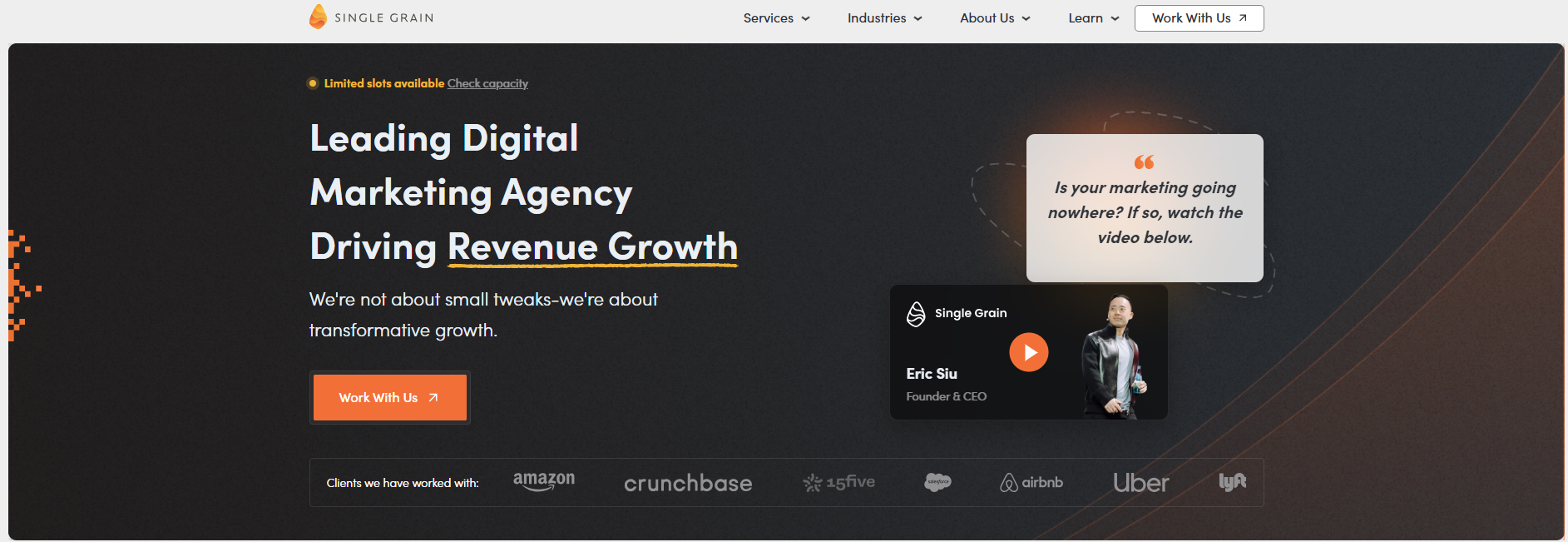How GEO Marketing Agencies Drive More Qualified B2B Leads
While traditional SEO agencies chase rankings, savvy B2B leaders are discovering that Generative Engine Optimization (GEO) agencies deliver something far more valuable: prospects who arrive pre-qualified and ready to engage. The question isn’t whether to invest in GEO, but how quickly you can get started.
The difference lies in intent capture. Traditional SEO targets keywords; GEO agencies target buyer journeys. They understand that when someone asks ChatGPT, “What’s the best marketing automation platform for SaaS companies with 50-200 employees?” they’re not browsing. They’re buying. This precision in targeting high-intent queries is exactly why forward-thinking CMOs are seeing their cost-per-acquisition plummet while lead quality soars.
Key Takeaways
- GEO agencies target buyer journeys instead of just keywords by optimizing for AI-powered search engines like ChatGPT and Google’s SGE, capturing prospects who arrive pre-qualified and ready to engage, rather than just browsing.
- Content clusters and comprehensive resources drive AI citations as GEO agencies create interconnected, in-depth content (3,000+ words) that AI engines can confidently cite when prospects ask detailed industry questions.
- Marketing automation integration amplifies GEO results by 451% through sophisticated lead scoring and personalization systems that nurture AI-discovered prospects at scale, transforming search visitors into sales-ready leads.
- Early GEO adoption creates compounding competitive advantages as established content authority makes future AI citations more likely, creating barriers to entry that become increasingly difficult for competitors to overcome.
- Proven results show 8% conversion rates on AI-engine traffic with leading implementations generating 491% lifts in organic clicks and 30-40% boosts in AI-generated answer visibility.
TABLE OF CONTENTS:
Search-First Strategy: Leveraging GEO for Qualified Lead Capture
GEO-specialized agencies can materially lift both lead quality and volume. But here’s what most marketing leaders miss: this represents just the beginning of what’s possible when you optimize for AI-powered search experiences.
GEO agencies approach lead capture differently than their traditional counterparts. Instead of optimizing for Google’s classic “10 blue links,” they focus on how AI engines like ChatGPT, Perplexity, and Google’s Search Generative Experience (SGE) process and recommend content. This involves creating comprehensive, authoritative resources that AI can confidently cite in response to prospects’ detailed industry inquiries.
Consider the buyer journey transformation. A prospect researching enterprise CRM solutions no longer needs to visit ten different websites to compare features. Instead, they ask an AI assistant for recommendations, which then pulls information from the most authoritative, semantically rich content available. GEO agencies ensure your content becomes that authoritative source.
The GEO Methodology: Beyond Traditional SEO

GEO agencies employ a fundamentally different approach to content optimization. While traditional SEO focuses on keyword placement and backlink acquisition, GEO prioritizes semantic depth, topical authority, and AI discoverability. This shift reflects how modern search engines, both traditional and generative, evaluate and recommend content.
The core GEO method centers on three pillars: comprehensive content clusters, structured data implementation, and continuous AI citation tracking. Content clusters involve creating interconnected resources that thoroughly address every aspect of a topic, allowing AI engines to understand the depth of your expertise. Structured data implementation ensures machines can easily parse and categorize your content for relevant queries. AI citation tracking monitors how frequently your content appears in generative search results, providing direct feedback on optimization effectiveness.
“The most successful GEO implementations treat content as a comprehensive knowledge base rather than individual marketing pieces. When AI engines can confidently pull detailed, accurate information from your content, they naturally position your brand as the authoritative source.”
This strategy extends beyond content creation into technical optimization. GEO agencies implement advanced schema markup, optimize for featured snippets, and ensure content loads quickly across all devices. They understand that AI engines evaluate technical performance as part of content quality assessment.
AI & Automation Alignment: Scaling GEO Lead Generation
The real power of GEO agencies emerges when they integrate AI-driven optimization with marketing automation. Businesses implementing marketing automation, often paired with AI-driven search optimization, see a 451% increase in qualified leads. This dramatic lift occurs because automation platforms amplify GEO outputs by nurturing and scoring AI-discovered prospects at scale.
The integration works through sophisticated lead scoring and personalization systems. When a prospect discovers your content through an AI-powered search, automation platforms immediately begin behavioral tracking. They monitor content engagement patterns, identify buying signals, and trigger personalized follow-up sequences based on demonstrated interests. This automated nurturing transforms more search visitors into sales-ready leads.
Advanced marketing automation strategies also enable GEO agencies to create feedback loops that continuously improve content performance. By tracking which content pieces generate the highest-converting leads, agencies can identify successful patterns and replicate them across other topics and industries.
| GEO Strategy | Lead Quality Impact | Volume Impact | Timeline to Results |
|---|---|---|---|
| AI Citation Optimization | High | Medium | 60-90 days |
| Content Cluster Development | Very High | High | 90-120 days |
| Automation Integration | Medium | Very High | 30-60 days |
| Structured Data Implementation | Medium | Medium | 45-75 days |
Content in the SGE Era: Fueling GEO Pipelines
Content remains the foundation of successful GEO strategies, but the requirements have evolved significantly. 85% of B2B marketers rely on content, optimised for AI search experiences, to generate leads, confirming that content-led lead generation has become dominant among B2B brands. However, AI-optimized content differs substantially from traditional SEO content in depth, structure, and intent alignment.
GEO agencies create content that serves dual purposes: informing human readers and providing comprehensive information for AI systems to process and cite. This means developing longer-form resources that address questions comprehensively rather than superficially. Unlike traditional SEO, which might target “marketing automation benefits” with an 800-word blog post, GEO agencies create 3,000-word comprehensive guides that cover implementation strategies, ROI calculations, vendor comparisons, and integration considerations.
The content optimization process also involves careful attention to natural language patterns and conversational queries. Since users interact with AI engines using natural speech, content must anticipate and answer questions as they’re actually asked, not just as they’re traditionally searched. This approach to geotargeting and customer identification ensures content resonates with both AI systems and human decision-makers.
Proven Results: GEO Agencies in Action

The theoretical benefits of GEO become compelling when examined through real-world implementations. A major B2B software company partnered with a leading GEO marketing agency to prove that Generative Engine Optimization could turn AI-engine visibility into a qualified pipeline. The results were dramatic: an 8% conversion rate on AI-engine traffic, 150 net-new qualified leads, a 491% lift in organic clicks, and a 30-40% boost in AI-generated answer visibility compared to baseline performance.
The technology sector offers similar potential. A smart home company worked with Single Grain Marketing to increase AI citations. They achieved a 200% increase in AI visibility, 8.4% more clicks, and a 32.1% surge in lead generation.
Enterprise implementations show even more impressive scale. BMC Software’s partnership with Single Grain generated 5,000 total leads, with over 2,500 converting to Marketing Qualified Leads. A 49.5% MQL rate that significantly exceeded industry benchmarks. The strategy combined intent data with GEO segmentation to focus ad spend and content on the most promising regions and accounts.

Implementation Framework: Getting Started with GEO
Successfully implementing GEO requires a structured approach that balances quick wins with long-term authority building. The most effective agencies begin with comprehensive content audits to identify existing assets that can be optimized for AI discovery. They analyze current search performance, identify content gaps where competitors dominate AI citations, and develop prioritized optimization roadmaps.
The technical foundation involves implementing advanced structured data markup, optimizing site architecture for AI crawling, and establishing tracking systems for AI citation monitoring. These technical elements must be in place before content optimization begins, as they determine how effectively AI engines can process and cite your information.
Content development follows a cluster-based approach, creating comprehensive resource hubs around core business topics. Each cluster includes pillar content (comprehensive guides), supporting articles (specific subtopics), and interactive resources (calculators, assessments, tools) that demonstrate expertise depth. This clustered approach helps establish topical authority that AI engines recognize and trust.
- Phase 1 (Months 1-2): Technical foundation setup, content audit completion, and initial optimization implementation
- Phase 2 (Months 3-4): Content cluster development, structured data deployment, and automation integration
- Phase 3 (Months 5-6): Performance optimization, AI citation tracking, and continuous improvement protocols
- Phase 4 (Ongoing): Scale successful patterns, expand topic coverage, and integrate emerging AI platforms
Choosing the Right GEO Agency Partner
Not all agencies claiming GEO expertise deliver genuine results. The most effective GEO agencies demonstrate a deep understanding of both AI systems and B2B buyer psychology. They should provide transparent reporting on AI citation frequency, lead quality metrics, and conversion attribution from AI-powered traffic sources.
Look for agencies that offer comprehensive approaches integrating enterprise SEO capabilities with cutting-edge GEO strategies. The best partnerships involve agencies that have a deep understanding of your industry and can create content that serves both AI discovery and human decision-making processes.
Evaluation criteria should include proven case studies with measurable results, technical expertise in AI optimization, and the ability to integrate GEO with existing marketing technology stacks. Agencies should also demonstrate continuous learning capabilities, as AI search technologies evolve rapidly and require ongoing strategy adaptation.
The Competitive Advantage of Early GEO Adoption
The businesses implementing GEO strategies in 2025 are positioning themselves for sustained competitive advantages as AI search adoption accelerates. Early adopters benefit from establishing authority in their industries before competitors recognize the opportunity, creating barriers to entry that become increasingly difficult to overcome.
The network effects of GEO success grow over time. As your content gains AI citations, it builds authority that makes future citations more likely. This creates a virtuous cycle where established GEO leaders become increasingly difficult to displace in AI-powered search results.
For marketing leaders evaluating GEO investments, the question isn’t whether AI search will impact your industry — it’s whether you’ll lead or follow in this transformation. The 451% lead increase potential demonstrates that early GEO adoption can fundamentally transform pipeline economics, making it an essential component of any forward-thinking marketing strategy.
The future of B2B lead generation is already here. And it’s powered by AI-optimized content that turns search visibility into qualified pipeline.
Ready to transform your lead generation with proven GEO strategies? Work with the leading GEO agency that has helped companies achieve 491% increases in organic traffic and 8% conversion rates on AI-engine traffic.
Ready to capture those 8% conversion rates while your competitors are still chasing keywords?
Related Video
Frequently Asked Questions
-
What makes GEO different from traditional SEO approaches?
GEO focuses on targeting buyer journeys and optimizing for AI-powered search engines like ChatGPT and Google’s SGE, rather than just optimizing for keyword rankings. It prioritizes creating comprehensive, authoritative content that AI engines can confidently cite when prospects ask detailed questions, capturing pre-qualified leads who are ready to engage rather than just browsing.
-
How long does it take to see results from GEO implementation?
GEO results vary by strategy, with automation integration showing results in 30-60 days and AI citation optimization taking 60-90 days. The most impactful content cluster development typically requires 90-120 days to show significant lead quality and volume improvements.
-
What type of content performs best for AI-powered search engines?
AI engines favor comprehensive, long-form content (3,000+ words) that thoroughly addresses topics rather than superficial coverage. Content should be structured in interconnected clusters, use natural language patterns, and anticipate conversational queries while providing detailed information that AI systems can confidently process and cite.
-
How do I measure the success of GEO campaigns?
Key GEO metrics include AI citation frequency, conversion rates on AI-engine traffic (top performers achieve 8%), and lead quality improvements. Successful implementations also track organic click lifts (up to 491%), AI-generated answer visibility (30-40% increases), and the percentage of qualified leads generated from AI-powered search sources.
-
What technical requirements are necessary for effective GEO?
GEO requires advanced structured data markup, optimized site architecture for AI crawling, and tracking systems for AI citation monitoring. These technical foundations must be implemented before content optimization begins, as they determine how effectively AI engines can process and cite your information.
-
How does marketing automation enhance GEO results?
Marketing automation amplifies GEO by nurturing AI-discovered prospects through sophisticated lead scoring and personalization systems. Businesses implementing automation with GEO strategies see a 451% increase in qualified leads, as automated systems track engagement patterns, identify buying signals, and trigger personalized follow-up sequences.
-
What should I look for when selecting a GEO agency partner?
Choose agencies that demonstrate measurable results with AI citation tracking, lead quality metrics, and conversion attribution from AI-powered traffic. Look for deep industry expertise, transparent reporting, technical proficiency in AI optimization, and the ability to integrate GEO with existing marketing technology stacks while showing continuous learning capabilities.





